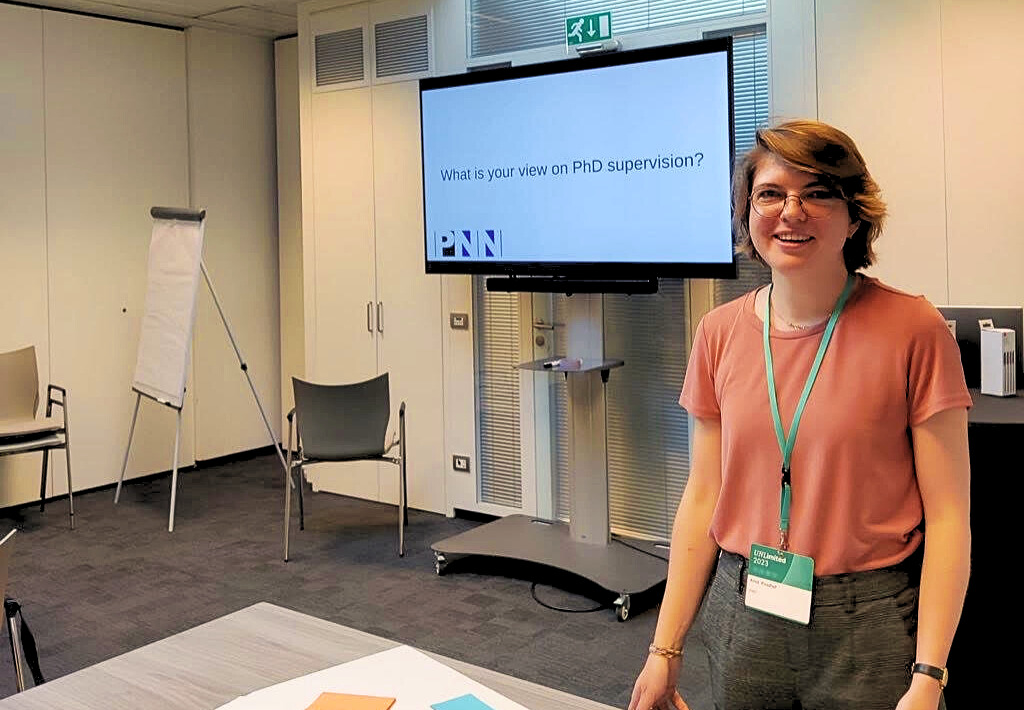On September 28th and 29th, PNN board members Lotte Weedage, Margrietha van der Linde and Anna Roodhof attended the first edition of UNlimited Festival - a conference organized by the Universities of the Netherlands. The festival was attended by a mix of policy makers at universities, academic staff, funding agencies, and government actors. The goal was to improve universities through collaboration among them, and to inspire one another with best practices. Issues on the agenda were for example increased work pressure among students, collaboration with the fossil industry, but also PhD education. Most PhDs are quite far removed from the behind-the-scenes politics that ultimately influence their place of work. For this reason, we wanted to give you a peek into the inner workings of Dutch universities which surfaced during this event.
DAY 1
Opening Speech by the Queen
A key theme of the festival was student well being. Queen Máxima is honorary chair of MIND Us, a foundation concerned with exactly this. She talked about how students are experiencing a lot of stress. This is partly due to the increased workload of students, but also partly due to increased cultural competitiveness where everything has to be ‘harder, better, faster, stronger’. Queen Máxima made a plea for normalizing ‘off days’, and creating room for reflexivity and taking time to learn.
Following Queen Máxima, three students went into conversation with minister of Education, Culture and Science, Robbert Dijkgraaf, and rector magnificus of the University of Amsterdam, Peter-Paul Verbeek, on the same topic. Here, the taboo of seeking help was addressed, and again, it was emphasized that ‘breathing room’ is vital to the learning process.
Table round on internationalization with ASML CEO Peter Wennink, Mantispectra COO Kaylee Hakkel, Minister Dijkgraaf, and UvA Rector Magnificus Peter-Paul Verbeek
A lively discussion on the issue of internationalization in which different interests met (read: clashed). As CEO of ASML, Peter Wennink sees internationalization as a vital process in order to attract talent for his company, which has close ties with the technical university of Eindhoven, and his interest therefore clashed with the new bill that seeks to restrict internationalization at Dutch universities. Minister Dijkgraaf suggested that part of this dissatisfaction could be relieved by explaining the bill more clearly, accordingly it was not interpreted correctly. Despite this attempt to bring nuance to the discussion, UvA rector magnificus Peter-Paul Verbeek still expressed concern regarding this bill, stating that Dutch universities are front-runners in global academia, which goes hand in hand with internationalization processes. Much of the research done by Dutch academics is published in international journals and done in dialogue with the international academic community, making it counterproductive to isolate ourselves.
Parellel Session: Language, inclusion, and belonging
In this session by Aya Ezawa from Leiden University issues of inclusion and belonging through use of language were discussed. Many participants expressed concern about the use of language to include non-binary or transgender students. One participant also raised the issue that (certain groups of) PhD candidates are often not represented in institutional language either, which mainly distinguishes between ‘students’ or ‘staff’ (e.g., bursary, sandwich, or external PhD candidates do not fall in either category).
Parallel Session: Breaking barriers, building bridges
This session was facilitated by Anke de Vrieze from the Centre of Unusual Collaborations and it tackled the extra workload that comes with interdisciplinary collaborations. While interdisciplinary collaborations are largely encouraged within academia, the realization of true collaboration requires a lot of extra work to ‘build bridges’. While many people have some interdisciplinary experience, Anke pointed out that there is a difference between collaborating with a similar discipline (e.g., physics and astronomy) and collaborating with a completely different discipline (astronomy and ecology). This work is often unrecognized and therefore also not rewarded. The participants were divided into smaller groups to discuss how this work could be recognized and rewarded.
Parallel Session: Designing your life – A career orientation (and mental health) course
Bram Hoonhout and Hannah Vogelsang organized this session about an open source course that is currently offered at Leiden University, but is available for anyone to use and implement. The course applies the ‘Designing your life’ approach developed by Bill Burnett and Dave Evans from Stanford University and is meant for students to think about and visualize different career paths they could take.
Keynote: Impact through fundamental science by astronomer Marc Klein Wolt from Radboud University
Astronomer Marc Klein Wolt shared an impact story about his own fundamental research project. The project entailed a new telescope to generate data about black holes. An optimal location for this is in Namibia, where a couple astronomers also happened to be working on this topic. A collaboration ensued, and the project kickstarted the training of local astronomers to operate and maintain the telescope in Namibia, thereby creating labor opportunities in Namibia. This case served to demonstrate how fundamental research – such as studying black holes – can still have societal impact.
Theater show by University of the Netherlands
University of the Netherlands (different from Universities of the Netherlands) is an organization that aspires to make science accessible to the public. They publish podcasts, videos and posts on their website, but more recently they also set up a theater show. In this show, two scientists (which differ per performance) are asked to talk about their research in an accessible way. The theater show is facilitated by comedian Fuad Hassen. In this edition of the show, professor of taxation law Sigrid Hemels (Erasmus University Rotterdam) discussed inheritance tax and cultural theologist Frank G. Bosman (Tilburg University) talked about free will.
DAY 2
Keynote: Social-psychological processes that influence (un)sustainable behavior by environmental psychologist (Rijksuniversiteit Groningen) Ellen van der Werff
Ellen van der Werff conducted extensive research on factors that influence people’s behavior. One study covered how the design on recyclable paper cups influences people’s recycling behavior. The study demonstrated that if the cup is green and has the recycling logo and/or other phrases to remind and encourage the user to recycle it, people were more likely to recycle the cup. The control cup, a cup with some mathematic formulas written on it, was recycled less often.
Parallel Session: PhD supervision, by yours truly, PNN!
We organized a session in which we first introduced the topic of PhD supervision to the participants. It turned out we had a very heterogeneous group of people: from external PhDs themselves to graduate school coordinators to policy advisors of the ministry of Education, Culture, and Science. After the short, plenary opening, the participants split up into three groups to discuss the following questions:
- What is your view on PhD supervision?
- What should good supervision look like?
- Should supervisors be supervised, and if so, how?
These questions amalgamated in very lively discussions among the participants, which we documented using post-its. We will still write a small report based on this session and communicate this back to the participants and publish it on PNN’s website.
Some recurring points that were made strongly align with the Recognition and Rewards agenda: PhD supervision needs to be taken more seriously as part of academic staff’s job description. Nor should it be a given that every researcher (postdoc, assistant, associate, or full professor) supervises PhD candidates. If a researcher does not want to supervise, nothing good can come from forcing them to take on this responsibility.
Discussion on collaboration with the fossil industry with UvA Rector Magnificus Peter-Paul Verbeek and Technical University Delft Rector Magnificus Tim van der Hagen
Yet another animated discussion where different interests surfaced. TU Delft rector magnificus Tim van der Hagen considered collaboration with the fossil industry absolutely vital in the energy transition. Van der Hagen stated that through collaboration, the fossil industry can be forced to become more sustainable. Alternatively, UvA rector magnificus Peter-Paul Verbeek has less faith in the fossil industry. He explained how the University of Amsterdam has a new policy in which collaboration with the fossil industry has become more restricted. Accordingly, fully banning collaboration would be counterproductive, but Verbeek emphasized that the conditions of collaboration are very strict: 1) It needs to contribute to the energy transition, and 2) There is no other party with which can be collaborated on the respective project. These policy changes followed student protests about ties with the fossil industry, and Verbeek found it important to address the students’ concerns.
SOME CONCLUDING THOUGHTS
At events such as this one, a lot of networking and policy influencing happens. Many proponents of the Recognition and Rewards programme and the Open Science-movement attended to get their foot in the door. Likewise, student representative organizations such as the Dutch National Student Association were also present. For this reason, it is also important for PNN to not only attend conferences like these and connect with policy makers from different universities during the network lunch, dinner, and drinks, but also organize a session to remind policy makers of PhD candidates’ interests. During our session, we were able to get the participants (who were very heterogeneous as a group) to think about PhD supervision issues: what they are and how they can be addressed.


